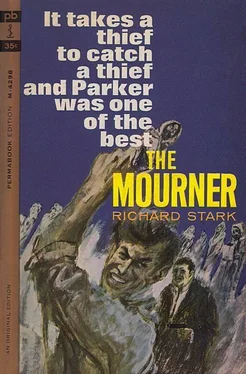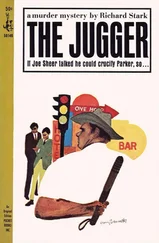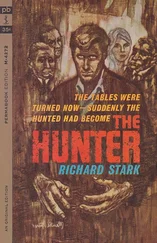“Good enough.”
McKay, too, had his moments of taciturnity.
From this point, when he actually entered the automobile and sat down next to McKay, until the operation was complete, he was in such a state of high excitement that he scarcely knew his name. The operation went like clockwork, and the delight bubbled up in him, mixed deliciously with terror, in a heady combination that was almost like a drug. They drove to the house in the stolen Cadillac, they entered, they found the room containing Kapor’s pitiful collection of bric-a-brac. And there for the first time Menlo saw the white mourner. In his state of heightened sensibilities he saw the mourner as being deeply meaningful and symbolic; in some convoluted way it expressed to him the end of mourning. Now at last all was within his grasp.
The head came off the Apollo, just as Clara had said it would, and inside was the money. It wasn’t really money to him yet — when he thought of money, he still thought of his native currency — but he knew he would have no difficulty in getting used to these unfamiliar green bills, with their Presidents and public buildings. The money poured out of the hollow Apollo, filling the suitcase and more, like a cornucopia. In excitement and dread and anticipation and pleasure so intermingled and intense that he came very close to fainting, he stuffed into his pockets the fingers caressing the crisp green bills, and then pulled his hand from his right pocket again, the fingers now gripping instead the small deadly black derringer.
Both tried to escape him, flinging themselves about, knocking statues down, but the excitement ended at his wrist. His hand was calm and steady. He fired twice, and each went down. They had to go down. In one lightning bolt of time, Auguste Menlo had become invincible. His finger twitched twice; his adversaries ceased to exist. Their husks, their empty shells, lay broken at his feet.
He stowed the derringer back in his pocket, hearing the crisp crinkle of the bills again, and hurried over to pick up the spoils. The statuette under his left arm, the suitcase — heavier now, much heavier — hanging from his right hand. He was flushed, feverish, victorious. He didn’t even remember turning the light off on his way out.
Menlo was dreaming.
First, there was a beach. There were great round beach umbrellas, and crowds of people swimming and splashing in the shallow water. Women wearing wool bathing suits and big floppy hats shading their eyes looked out over the water, and men and other women lay face down on blankets, sunbathing. There was a steady roar of sound, shouting and splashing and laughing, ebbing and flowing like the waves that trickled up the flat beach and down again. And children running, people hurrying this way and that. But it was all muted, all slowed down. The shouting and splashing sounded far off as if under water, and all the running and scurrying was like a moving picture run in slow motion.
A woman came walking toward Menlo across the beach. She was tall and golden and blonde and slender, with pleasing fullnesses where they should be, and she was totally nude. But no one else paid any attention. She came closer and closer to him, smiling with a smile that offered everything, and he recognized her but he couldn’t remember her name. He stared at her, trying to remember, and wondering why no one at the beach was alarmed by her nudity. Then the sun got into his eyes, making them sting and water, and he closed them for relief. When he opened them again, the woman was closer, but now she was wearing Parker’s face.
“No!” Menlo screamed, and in a sudden great gout of flame and smoke she disappeared. He looked out over the water, and a huge ship with tremendous white sails was racing toward him, bombarding the beach. The gouts of flame and smoke roared up all around him. People were screaming, and running every which way.
He dropped to his knees and began scrabbling in the sand, digging a hole to hide in, when a voice said, “Why not just clamp down hard on the capsule, my friend and save all that digging?”
He looked up, there was Spannick, sitting on a kitchen chair, and smiling at him. The kitchen chair was very slowly sinking into the sand under Spannick’s weight.
“You’re dead,” he shouted, and Spannick’s face changed to Parker’s. He closed his eyes, knowing he was doomed. He opened them again, and he was in a motel room with one green wall and one white wall and one yellow wall and one wall of glass covered by draperies of the three colors all combined, and he was alone.
He sat up, and slowly the realization came to him that this was truth, that he was awake and the nightmare was over. His elbows were trembling, and his mouth hung open. He tried to close it, but his jaw immediately fell slack again. He tried again, and it fell slack again. He kept trying, sitting mounded in the middle of the bed like a squat pink fish, his elbows trembling and his mouth closing and falling open, closing and falling open. But reality was returning to him, and in a minute he got up from the bed and stood in the middle of the room. He was naked, in honor of the United States and Bett Harrow.
Nightmares did come to him from time to time, particularly when he had been working too hard, or an assignment was unusually difficult, like the purging of an old friend. He knew nightmares, and he knew what to do about them, how to pull their teeth and lay them to rest. The trick was to go over the nightmare detail by detail, remembering it as fully and completely as possible, discovering what part of his past experience had produced each distortion.
Still shaky, he lit a cigarette, and discovered that even American cigarettes taste foul immediately after one wakes up. Still, it should help calm his nerves. He made a face, and dragged deep.
The nightmare then. First, the beach. That was easy. It was one of the tourist beaches on the Caspian Sea; he had never been there, but he had seen such beaches in motion pictures. And in this instance it was meant to symbolize Miami Beach, which he had never seen, even in films.
The nude woman. Bett Harrow, of course. Odd he couldn’t remember her name in the dream. Perhaps that meant she was not an individual to him. She, and the airline stewardess, and all the women in the American magazines were simply an erotic goal, with interchangeable bodies and faces and names. One would do as well as another. He was somewhat surprised and pleased to find his subconscious so smug about his interlude with Bett Harrow.
Next, Parker’s face. It had cropped up twice, each time attached to another’s body. He had met the Harrow woman through Parker, of course, but with Parker’s face on Spannick’s body as well, there had to be a different answer.
It could be that Parker had no body anymore, Menlo having murdered it. Was some essence of Parker after him, seeking vengeance? Friends of Parker? It was hard to imagine the man having any friends. Besides, even if he did, what did they know of Menlo? Nothing. Only the Harrow woman, and she was already aware that he intended to kill Parker, and approved. So the double appearance of Parker’s face was simply an oversensitive reaction of having eliminated such a formidable opponent.
Next, the ship with the white sails. He had to think about that for a few minutes, pacing back and forth in front of the bed, and at last it came to him. Jenny’s song, from Dreigroschenoper. The pirate ship. He had been in mortal danger from the pirates — first the Outfit, and later Parker and McKay — and this was simply a recording of that fact. And the same was true of Spannick’s appearance, saying exactly what he had said in the cellar that night.
He understood the dream now, and its terror was washed away. He went over to the nightstand, picked up his watch, and saw that it was ten minutes to four. He had slept six hours, having fallen deeply asleep immediately after returning here from Kapor’s house, feeling after the high-pitched excitement of the robbery and killings a lethargy unlike any drowsiness or exhaustion he had ever know before. So he had slept, purging his mind of all residual terrors through his nightmare, and now he was rested and calm.
Читать дальше












